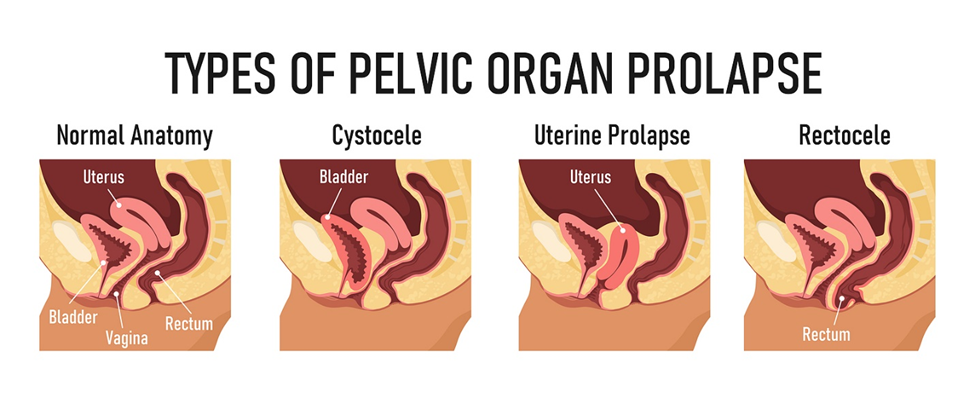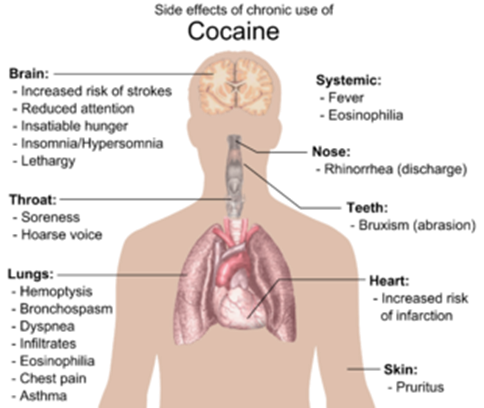A nurse is reading a journal article about care of the woman with pelvic organ prolapse. The nurse would expect to find information related to which disorder? (Select All that Apply.)
rectocele
fecal incontinence
urinary incontinence
cystocele
enterocele
Correct Answer : A,D,E
A. Rectocele:
A rectocele is a type of pelvic organ prolapse where the rectum bulges into the back wall of the vagina. Management and care of women with rectocele are relevant to the topic of pelvic organ prolapse.
B. Fecal incontinence:
Fecal incontinence refers to the inability to control bowel movements, which is not a typical symptom or complication of pelvic organ prolapse. While pelvic floor dysfunction can contribute to fecal incontinence, it is not the primary focus of care for women with pelvic organ prolapse.
C. Urinary incontinence:
Urinary incontinence, particularly stress urinary incontinence, can coexist with pelvic organ prolapse due to pelvic floor muscle weakness. However, urinary incontinence is a separate condition that may require different management approaches compared to pelvic organ prolapse. While relevant in the context of pelvic floor dysfunction, urinary incontinence is not specific to the care of women with pelvic organ prolapse.
D. Cystocele:
A cystocele is a type of pelvic organ prolapse where the bladder protrudes into the front wall of the vagina. Management and care of women with cystocele are also pertinent to the topic of pelvic organ prolapse.
E. Enterocele:
An enterocele is a type of pelvic organ prolapse where the small intestine bulges into the upper vaginal wall. Information about the care of women with enterocele would be expected in a journal article about pelvic organ prolapse.

Nursing Test Bank
Naxlex Comprehensive Predictor Exams
Related Questions
Correct Answer is D
Explanation
A. Alcohol:
Alcohol consumption during pregnancy can lead to a range of adverse effects on the fetus, collectively known as fetal alcohol spectrum disorders (FASDs). However, the symptoms described in the scenario—tachycardia, hypertension, and evidence suggesting vasoconstriction—are not typical of alcohol use. While alcohol can lead to hypertension in chronic heavy drinkers, it is not commonly associated with tachycardia and vasoconstriction in the same way that stimulant drugs like cocaine are.
B. Heroin:
Heroin is an opioid drug that depresses the central nervous system, leading to effects such as respiratory depression, sedation, and decreased heart rate. While heroin use during pregnancy can have serious consequences for both the mother and the fetus, including neonatal withdrawal syndrome (neonatal abstinence syndrome), it is not typically associated with tachycardia, hypertension, and vasoconstriction. Therefore, heroin is less likely to be the substance causing the symptoms described in the scenario.
C. Marijuana:
Marijuana use during pregnancy has been associated with various adverse outcomes, including low birth weight and neurodevelopmental issues in children. However, the symptoms described—tachycardia, hypertension, and evidence suggesting vasoconstriction—are not typical of marijuana use. Marijuana is more commonly associated with effects such as relaxation, increased heart rate (tachycardia), and vasodilation (not vasoconstriction). Therefore, marijuana is less likely to be the substance causing the symptoms described in the scenario.
D. Cocaine:
Cocaine is a potent stimulant drug that acts on the central nervous system and cardiovascular system, leading to effects such as tachycardia, hypertension, and vasoconstriction. These symptoms are consistent with acute cocaine intoxication. Cocaine use during pregnancy can have serious adverse effects on both the mother and the fetus, including increased risk of miscarriage, preterm labor, placental abruption, and fetal growth restriction. Therefore, given the symptoms described in the scenario, cocaine is the substance that the nurse would question the woman about.

Correct Answer is C
Explanation
A. adjunct therapy to radiation and chemotherapy:
This option is not applicable to HIV/AIDS treatment. Antiretroviral therapy (ART) is specifically used to treat HIV infection by targeting the replication of the virus. It is not used as adjunct therapy to radiation or chemotherapy, which are treatments typically used for cancer.
B. treatment of opportunistic infections:
While antiretroviral therapy (ART) can help prevent opportunistic infections by boosting the immune system, its primary purpose is not the treatment of these infections. Rather, ART focuses on suppressing the replication of the HIV virus itself.
C. reduction in viral loads in the blood:
This is the correct rationale for antiretroviral therapy. The main goal of ART is to reduce the viral load in the blood to undetectable levels. By doing so, ART helps to slow the progression of HIV infection, improve immune function, and reduce the risk of transmitting the virus to others.
D. can cure acute HIV/AIDS infections:
This statement is incorrect. While antiretroviral therapy (ART) is highly effective in controlling HIV infection and preventing progression to AIDS, it does not cure acute HIV/AIDS infections. HIV remains a chronic condition that requires lifelong management with ART.
Whether you are a student looking to ace your exams or a practicing nurse seeking to enhance your expertise , our nursing education contents will empower you with the confidence and competence to make a difference in the lives of patients and become a respected leader in the healthcare field.
Visit Naxlex, invest in your future and unlock endless possibilities with our unparalleled nursing education contents today
Report Wrong Answer on the Current Question
Do you disagree with the answer? If yes, what is your expected answer? Explain.
Kindly be descriptive with the issue you are facing.
